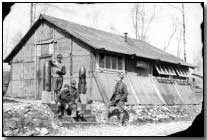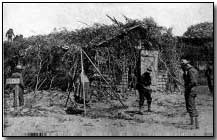Memoirs & Diaries - In a Billet
 There are many Tommies who
will tell you that the average French peasant would not move a hand's turn
to ease the lot of the British soldier, but this is what happened to me.
There are many Tommies who
will tell you that the average French peasant would not move a hand's turn
to ease the lot of the British soldier, but this is what happened to me.
I had a workable knowledge of French, and so it became my job to go on ahead of the battalion and help to find billets. We were coming out of the line to a small village called Famechon in the winter of 1916-17. The billeting party of one officer and five more "other ranks" arrived at the village, and set out in parties to find the possibilities of the place. I knocked at the door of one cottage that stood in the comer of a small field, and an old woman came to the door.
It would be very hard to describe her, for she was bent, wrinkled, and her tousled hair and toothless gums gave her the appearance of a witch. She was more like one of Macbeth's witches than any that I have ever seen on the stage. Her appearance almost repelled me, and more out of custom than from any other motive I asked if she had any accommodation.
She looked at me very keenly for a moment and then said, "'I have a spare bed." "For an officer?" "An officer, ah no! My son used to sleep on straw. You can have his bed, but no officer shall ever sleep in it."
I thought she must have some bee in her bonnet on the matter of officers, so I bade her adieu and went on with the rest of my job. I found that we had beds enough without troubling the old woman, so I wangled that particular bed for myself. Any bed before a barn was a working motto in those bitter days.
The first evening I was there she asked me all the particulars she could think of. She wanted to know my name, age, next of kin, and so on, until I thought her the limit in being inquisitive. Then she took me into the family, for she addressed me as "mon garcon" and used the familiar "tu" in place of "vous". To carry on the comedy, I often called her, "ma mere," and she seemed to like that mode of address.
She had one peculiar habit. She often opened a black snuff-box and took a very liberal pinch. When I teased her about it, she merely shrugged her shoulders and said it was "Bon pour la tete."
The second night, as I sat near the stove, I shivered ever so slightly. Her quick black eyes saw it. "Thou art chilled, my son," she said. "It's nothing," I remarked. "Nothing? I can see by thy eyes that thou art ill. Get thee to bed."
"Not yet," I mumbled. "Not yet? Do as I bid thee," and she turned on me like a fury. She knew I was ill. She thought so at first, and she was sure now. I was a fool to sit up near the stove. My place was in bed, and so on. More to humour her, I went to bed.
It did not seem more than two minutes after I was in bed before she came into the bedroom with a great bowl full of boiled milk. "It is for thee," she said, by way of explanation. "Drink it."
 Protests were useless, and
I had to drink it whilst she stood over me, looking like a veritable witch.
I slept that night bathed in perspiration, and woke to find that she had
sent word to the M.O., and he was standing over me, feeling my pulse.
I was ill and had to stay in bed. Pills were sent round per the
orderly.
Protests were useless, and
I had to drink it whilst she stood over me, looking like a veritable witch.
I slept that night bathed in perspiration, and woke to find that she had
sent word to the M.O., and he was standing over me, feeling my pulse.
I was ill and had to stay in bed. Pills were sent round per the
orderly.
"Didn't I tell thee?" said the old crone. "Now stay where thou art and do as I tell thee."
Bowl after bowl of boiled milk she brought to me, until I seemed to be drinking all the yield of her solitary cow. I loathed the sight of her milk. She busied herself on my behalf, and I could hear the patter of her wooden sabots on the tiled floor as she went about some household tasks.
Often I would see her looking at me with a very strange look on her old wrinkled face, and on the last day of our "rest" I was allowed to get up. It was then that the M.O. told me how ill I had been. I had just missed pneumonia. If I had not had a bed I should have been sent to the Field Ambulance, and I remembered a pneumonia case that died two cots from mine in the Field Ambulance.
"Ma mere," I said to the old woman, "I have been very grateful for all that you have done for me. How much shall I give you to repay you for your work and worry?"
She took my great rough hand in both of hers, and with a look of inestimable charm that her wrinkles could not efface she looked up into my face and smiled.
 "My boy," she said, "thou
art such another as the son I had, but whom the good God thought fit to take
from me. Thou art of his form and almost of his face. Thou art
of his age, too. Sometimes I have prayed that the Blessed Virgin might
send him back to me, but that thou knowest is impossible. She sent
thee to me when thou hadst most need of a mother, and for these last few
days I have been with a son of my own again. Talk not to me of
repayment. I will tell thee what thou mayst do for me. Buy no
more than quatre sous' worth of snuff, for a pinch is good for the head."
"My boy," she said, "thou
art such another as the son I had, but whom the good God thought fit to take
from me. Thou art of his form and almost of his face. Thou art
of his age, too. Sometimes I have prayed that the Blessed Virgin might
send him back to me, but that thou knowest is impossible. She sent
thee to me when thou hadst most need of a mother, and for these last few
days I have been with a son of my own again. Talk not to me of
repayment. I will tell thee what thou mayst do for me. Buy no
more than quatre sous' worth of snuff, for a pinch is good for the head."
I listened with tears in my eyes as she told me this, and I do not think I shamed my manhood by them. I felt ashamed to think that I, as big as a bull compared with her, should not have a heart as big as a pea, whilst in her poor, shrunken form was a heart as big as a drum.
C.Q.M.S. Harry Drake enlisted September 9th, 1914, in the 16th West Yorks Regt. (Bradford "Pals" Battalion). Served with the battalion as corporal, sergeant, C.Q.M.S., and A/R.Q.M.S. in Egypt and France. Upon the reorganization of brigades in 1918, he was posted as A/R.Q.M.S. to the 3rd Entrenching Battalion. In March of 1918 he was reposted as C.Q.M.S. in the 15th West Yorkshire Regt.; he was demobilized in February 1919.
First published in Everyman at War (1930), edited by C. B. Purdom.
Photographs courtesy of Photos of the Great War website.
"Boche" was a disparaging term used to describe anything German.
- Did you know?
